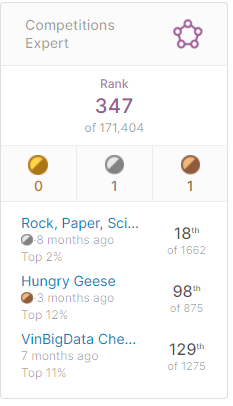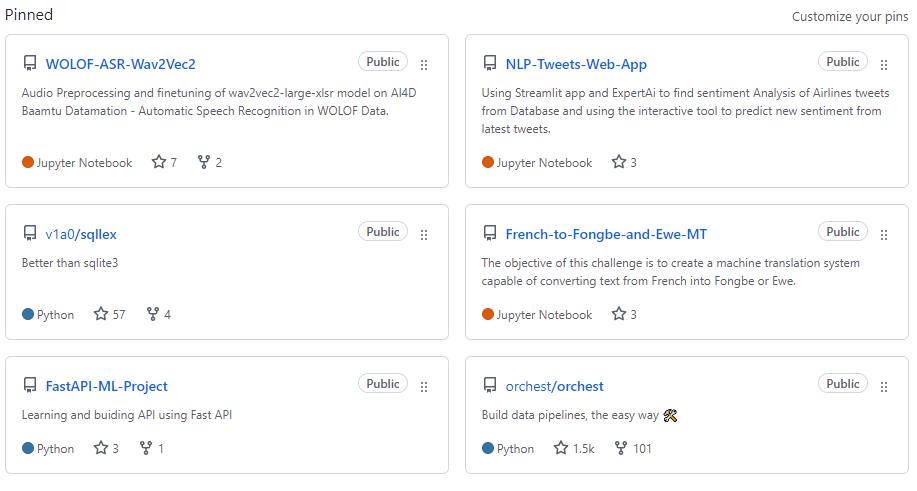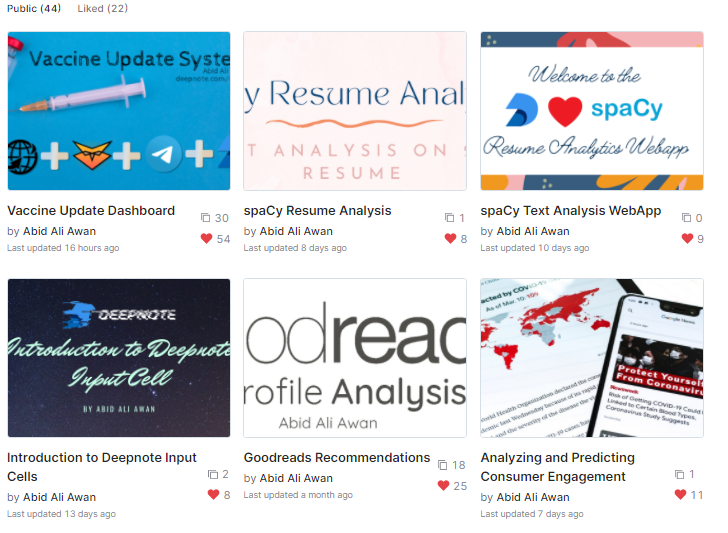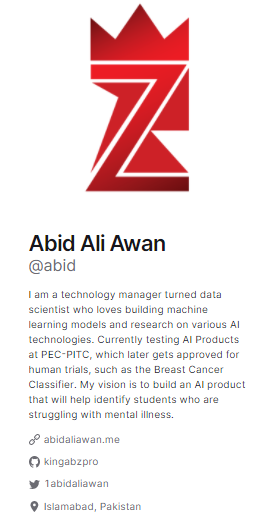
How to Ace Data Science Interview by Working on Portfolio Projects.
Last Updated on December 27, 2021 by Editorial Team
Author(s): Abid Ali Awan
Originally published on Towards AI the World’s Leading AI and Technology News and Media Company. If you are building an AI-related product or service, we invite you to consider becoming an AI sponsor. At Towards AI, we help scale AI and technology startups. Let us help you unleash your technology to the masses.
Careers
Learn how maintaining GitHub, Deepnote, and Kaggle profiles helped me ace multiple data science interviews.

Introduction
Recruiters are checking your online presence before contacting you about an interview. They will look for your LinkedIn profile, GitHub, and Kaggle to figure out what value will you bring to their company. The hiring manager will also look for the latest blogs or projects to prepare interview questions so that they can test your intelligence — catherinescareercorner. Other than that, working on real-world projects will also give you the required experience for the job, and adding projects to your portfolio will make a good impression on the recruiter’s data-flair.

We will be learning new ways to crack your interviews by creating a strong portfolio that will help clear the technical interview stage. I will give you tips on improving your current projects and how recruiters go through your profile. The article is based on my personal experience and the things I learn from career coaches.
After reading this article you will improve your chance of passing the interview stage.

Interview # 1
A recruiter contacted me after going through my Kaggle profile and told me how he was impressed by my recent competition performance. He asked me if he will love to talk more on a call. To be honest, I was surprised by how a financial organization this big contacted me through Kaggle and how contributing to competition landed me an interview with a principal data scientist.

Insight
Participating in the Kaggle competition can land you a job.
During the interview, we have talked about my previous projects and my previous competitions. I explained to him that how I am actively participating in other competitive platforms such as Zindi. He asked me about the project I was currently working on and what are my future goals.
Insight
Creating portfolio projects will defend your skills on your resume.
At the end of the interview, he was quite impressed with my current performance and told me that I was the best possible candidate for this job.
Interview # 2
This interview was quite different as the data scientist who took my interview focused more on my GitHub profile rather than my resume. After this interview, I realized how much recruiters are interested in a portfolio rather than a LinkedIn profile or resume.
So, after applying for the job on LinkedIn, I received an email regarding the interview and during the interview, we talked about my GitHub projects. They even asked me what were the problems I faced during the project and how I solved that problem.

Insight
Even data scientists maintain GitHub profiles.
After the interview, I went back to see my profile and noticed that the interviewer was focusing on the latest projects in my repository with descriptions. He also talked about my pinned projects, and I was about to answer every question because I knew every part from start till the end of these projects.
Insight
Always pinned/highlight the projects you have worked on 100%.
Overall, the interview went smoother than I thought, and I received exceptional feedback from the recruiters as they were comparing me with Harvard Graduates.
Interview #3
The third interview was quite surprising as I was interviewed by five people from different departments, and they all talked about my Deepnote profile directly or indirectly. This interview was the reason I begin to draft this article so that other people can take advantage of my experience.
After applying for a job, I received a call from the top telecommunication company in my country. My first interview was taken by three experts in their field. They asked me about my past work and my goals. After the initial introduction, we dove into detailed discussions about my projects and Deepnote profile. The expert data scientist asked me key questions about NLP and how I was using them in my projects. They went through top projects and asked me about how I solved certain problems.
Insight
Publish your best work in form of notebooks with detailed descriptions.

My second interview was conducted by higher management who were interested in my mindset and how I can deal with certain data. They asked me about feature engineering and finally one of the managers asked me about my Deepnote profile bio. He was interested in my vision of building an application that will help students struggling with mental illness. In the end, he asked me how working in the company can help you reach your goal.
Insight
The biography should be personal, it should describe your life goals.

Both of my interviews were excellent in terms of feedback, and the company's higher management was impressed with my answers about my future goals. I have explained how working with them will help me grow and achieve my goals in long run.
Tips
- Tidy up your profile: If you have an interview related to NLP, make irrelevant repo and notebook private, so that the interviewer can focus on the projects related to the field.
- Project Descriptions: make sure the first line they read is about the project summary. Writing a description about the GitHub repo or Deepnote notebook will help the recruiter comes up with related questions.
- Revise your Project: You should go through the project description on GitHub or Deepnote so that during the interview you can answer in detail about what this project was about and how you can overcome some of the critical issues.
- Keep your Portfolio Up to date: This will make an impression on the recruiter that you are actively contributing to the project. This will also help you improve your skills, with a unique problem comes the unique learning experience.
- Focus on profile bio: Write about your job experience and your current project. Writing about your goals will help you get noticed. Make sure that it’s your personal story and you care about your vision.
- Participate in the Kaggle competition: This will improve your chance to get noticed and this will make you an attractive candidate for a job.
- Revises Data Science cheatsheet: Even though you know everything about your project, you might get stuck in technical knowledge such as topic modeling and how tf-idf works.
Author
Abid Ali Awan (@1abidaliawan) is a certified data scientist professional who loves building machine learning models. Currently, he is focusing on content creation and writing technical blogs on machine learning and data science technologies. Abid holds a Master’s degree in Technology Management and a bachelor’s degree in Telecommunication Engineering. His vision is to build an AI product using a graph neural network for students struggling with mental illness.
You can follow me on LinkedIn, Ko-fi and Polywork where I post my article weekly.
Original blog is published on KDnuggets.
How to Ace Data Science Interview by Working on Portfolio Projects. was originally published in Towards AI on Medium, where people are continuing the conversation by highlighting and responding to this story.
Join thousands of data leaders on the AI newsletter. It’s free, we don’t spam, and we never share your email address. Keep up to date with the latest work in AI. From research to projects and ideas. If you are building an AI startup, an AI-related product, or a service, we invite you to consider becoming a sponsor.
Published via Towards AI
Take our 90+ lesson From Beginner to Advanced LLM Developer Certification: From choosing a project to deploying a working product this is the most comprehensive and practical LLM course out there!
Towards AI has published Building LLMs for Production—our 470+ page guide to mastering LLMs with practical projects and expert insights!

Discover Your Dream AI Career at Towards AI Jobs
Towards AI has built a jobs board tailored specifically to Machine Learning and Data Science Jobs and Skills. Our software searches for live AI jobs each hour, labels and categorises them and makes them easily searchable. Explore over 40,000 live jobs today with Towards AI Jobs!
Note: Content contains the views of the contributing authors and not Towards AI.














